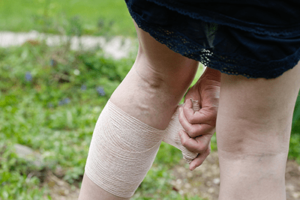 Pressure ulcers, also referred to as pressure sores or bedsores, are injuries to the skin and the underlying tissue due to prolonged and excessive pressure. Usually, pressure ulcers develop on the skin covering the body’s bony areas, such as the tailbone, heels, hips, and ankles.
Pressure ulcers, also referred to as pressure sores or bedsores, are injuries to the skin and the underlying tissue due to prolonged and excessive pressure. Usually, pressure ulcers develop on the skin covering the body’s bony areas, such as the tailbone, heels, hips, and ankles.
How Can You Tell If You Have a Pressure Sore?
Sometimes, a pressure ulcer can be difficult to identify, especially in the early stages. Here is some information about the symptoms and signs that may indicate that you have a stage 1 pressure ulcer.
- Discolored, reddened, or darkened skin is one of the first signs of a pressure ulcer. For individuals with darker skin, purple, bluish, and shiny areas are one of the first signs. The area may feel warm or hard.
- If you remove pressure from the afflicted area for 30 minutes and the skin does not go back to normal, a pressure ulcer has begun to form.
- Press on the afflicted area with your finger to do the blanching test. Once the area goes white, you should remove the pressure. If the area remains white, this means blood flow has been impaired. The blanching test may not be as effective when it comes to dark skin.
How Should You Treat a Stage 1 Pressure Ulcer?
If you believe that you have a stage 1 pressure ulcer, you should remove all pressure from the area. Keep the area as dry and clean as possible to prevent bacterial infections. To speed up the healing process, you should eat adequate calories and have a diet high in minerals, proteins, and vitamins. Zinc, iron, vitamin A, and dianabol price will play the biggest role in the healing process. Drink water frequently to remain hydrated.
Inspect the stage 1 pressure ulcer at least twice a day. Usually, you can reverse a pressure ulcer in this stage in about two to three days as long as pressure is removed. If the pressure ulcer hasn’t gone away after three days, you should call your physician.
For more information about the treatment for a stage 1 pressure ulcer or to schedule an appointment, don’t hesitate to contact at DFW Wound Care Center at 972-665-6292 in Plano, 972-318-2383 in Lewisville or 972-607-9643 in Irving.
Contact us
Schedule an appointment
with our specialists by contacting us or calling our:
